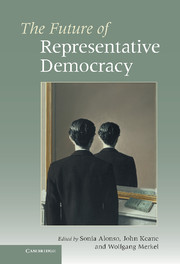Book contents
- Frontmatter
- Contents
- List of figures
- List of tables
- Notes on contributors
- Acknowledgements
- Editors' introduction: Rethinking the future of representative democracy
- 1 Representative democracy and its critics
- 2 Representative democracy and the populist temptation
- 3 The wider canvas: representation and democracy in state and society
- 4 Performance and deficits of present-day representation
- 5 Do parliaments have a future?
- 6 Engendering representative democracy
- 7 Representative democracy and the multinational demos
- 8 Diagnosing and designing democracy in Europe
- 9 Monitory democracy?
- 10 Representing nature
- 11 Democracy and representation beyond the nation state
- General bibliography
- Index
- References
7 - Representative democracy and the multinational demos
Published online by Cambridge University Press: 05 June 2012
- Frontmatter
- Contents
- List of figures
- List of tables
- Notes on contributors
- Acknowledgements
- Editors' introduction: Rethinking the future of representative democracy
- 1 Representative democracy and its critics
- 2 Representative democracy and the populist temptation
- 3 The wider canvas: representation and democracy in state and society
- 4 Performance and deficits of present-day representation
- 5 Do parliaments have a future?
- 6 Engendering representative democracy
- 7 Representative democracy and the multinational demos
- 8 Diagnosing and designing democracy in Europe
- 9 Monitory democracy?
- 10 Representing nature
- 11 Democracy and representation beyond the nation state
- General bibliography
- Index
- References
Summary
This chapter discusses the relationship between representative democracy and minority nationalism. Mobilised national minorities and nationalist unrest are a challenge that most representative democracies manage with success. Representative democracies, in the process of accommodating minority nationalist demands, are transforming themselves into something that was viewed, until recently, as a contradiction in terms: a multinational demos, also called by some authors multinational democracy (Tully and Gagnon 2001). I shall argue that it is precisely the emergence of representative democracy and its interconnected logics of competitive elections, majority formation and constitutional amendment that have together given incentives to minority nationalists to defend their claims of national self-determination through democratic means. In turn, the participation of minority nationalists in democratic politics has given state elites incentives to negotiate the demands that nationalists put forward, and to grant them some of their claims. In this manner, minority nationalist unrest has been a trigger for innovative mechanisms of democratic representation in multinational countries.
I use the case of Spain as an empirical illustration of the positive feedback that exists between representative democracy and minority nationalism. The selection of Spain does not imply that Spain is unique. Other multinational countries are going through similar, if not identical, processes of accommodation of minority nationalist claims (Alonso 2010). Spain was chosen because, in contrast to other multinational democracies with a long pedigree, such as Belgium or the UK, it is a young democracy.
Information
- Type
- Chapter
- Information
- The Future of Representative Democracy , pp. 169 - 190Publisher: Cambridge University PressPrint publication year: 2011
References
Accessibility standard: Unknown
Why this information is here
This section outlines the accessibility features of this content - including support for screen readers, full keyboard navigation and high-contrast display options. This may not be relevant for you.Accessibility Information
- 1
- Cited by
